The Barkhu is the official “call to prayer,” marking the entrance to the reading of the Shema’. In the ancient synagogues, everything prior to the Barkhu would be recited at home. Thus it serves as an instruction: the prayer leader says “Bless ye Adonai, the blessed one!” and the congregation response “Blessed be Adonai, the blessed one, forever and ever!,” which the prayer leader repeats. The Barkhu is also found in several other locations, such as the opening blessing for a Torah ‘aliyah and (in some communities) after the final Kaddish. Because of its call-and-response structure, not to mention its express purpose as a call to prayer, it is not recited when praying alone. But the idea that the liturgy is meant to be a communal celebration doesn’t need to be lost when praying alone.
This text arranges multiple Biblical verses in a catena. It is introduced and closed with verses from the book of Neḥemiah, verses often considered the source for the custom of calling to prayer. In between are poetic texts from the Song of Deborah and from Psalms that direct the term “Barkhu” — the plural imperative “Bless ye!” — at God. It could be recited alone in the location where the Barkhu would traditionally be recited, or said aloud in a community when no minyan is available. Alternatively, it could be used WITH a minyan as a text to introduce the Barkhu, a new step in of a line of poetic introductions to the service written for multiple generations.
This is part three in a series of replacements when praying alone for the Askhenazi rite that the editor is submitting.
| Source (Hebrew) | Translation (English) |
|---|---|
וַיְבָ֣רֶךְ עֶזְרָ֔א אֶת־יְהֹוָ֥ה הָאֱלֹהִ֖ים הַגָּד֑וֹל וַיַּֽעֲנ֨וּ כׇל־הָעָ֜ם אָמֵ֤ן ׀ אָמֵן֙ בְּמֹ֣עַל יְדֵיהֶ֔ם וַיִּקְּד֧וּ וַיִּֽשְׁתַּחֲו֛וּ לַיהֹוָ֖ה אַפַּ֥יִם אָֽרְצָה׃ (נחמיה ח:י) |
And ‘Ezra blessed Adonai the great God, and all the people answered “Amen, amen,” as they lifted their hands, and they bowed and prostrated before the Cause, face to the ground.[1] Nehemiah 8:10. |
בִּפְרֹ֤עַ פְּרָעוֹת֙ בְּיִשְׂרָאֵ֔ל בְּהִתְנַדֵּ֖ב עָ֑ם בָּֽרְכ֖וּ יְהֹוָֽה׃ (שופטים ה:ב) | |
לִבִּי֙ לְחוֹקְקֵ֣י יִשְׂרָאֵ֔ל הַמִּֽתְנַדְּבִ֖ים בָּעָ֑ם בָּרְכ֖וּ יְהֹוָֽה׃ (שופטים ה:ט) | |
בָּרְכ֖וּ עַמִּ֥ים ׀ אֱלֹהֵ֑ינוּ וְ֝הַשְׁמִ֗יעוּ ק֣וֹל תְּהִלָּתֽוֹ׃ (תהלים סו:ח) בְּֽ֭מַקְהֵלוֹת בָּרְכ֣וּ אֱלֹהִ֑ים אֲ֝דֹנָ֗י מִמְּק֥וֹר יִשְׂרָאֵֽל׃ (תהלים סח כז) | |
בָּרְכ֥וּ יְהֹוָ֗ה מַלְאָ֫כָ֥יו גִּבֹּ֣רֵי כֹ֭חַ עֹשֵׂ֣י דְבָר֑וֹ לִ֝שְׁמֹ֗עַ בְּק֣וֹל דְּבָרֽוֹ׃ בָּרְכ֣וּ יְ֭הֹוָה כׇּל־צְבָאָ֑יו מְ֝שָׁרְתָ֗יו עֹשֵׂ֥י רְצוֹנֽוֹ׃ בָּרְכ֤וּ יְהֹוָ֨ה ׀ כׇּֽל־מַעֲשָׂ֗יו בְּכׇל־מְקֹמ֥וֹת מֶמְשַׁלְתּ֑וֹ בָּרְכִ֥י נַ֝פְשִׁ֗י אֶת־יְהֹוָֽה׃ (תהלים קג:כ-כב) |
Bless ye Adonai, God’s messengers, great strong ones, doing God’s word, to hear the sound of God’s word. Bless ye Adonai, all God’s multitudes, Divine guardians, doing God’s will. Bless ye Adonai, all God’s works, in all the places of God’s kingship; bless, my soul, Adonai![6] Psalms 103:20-22. |
בֵּ֣ית יִ֭שְׂרָאֵל בָּרְכ֣וּ אֶת־יְהֹוָ֑ה בֵּ֥ית אַ֝הֲרֹ֗ן בָּרְכ֥וּ אֶת־יְהֹוָֽה׃ בֵּ֣ית הַ֭לֵּוִי בָּרְכ֣וּ אֶת־יְהֹוָ֑ה יִֽרְאֵ֥י יְ֝הֹוָ֗ה בָּרְכ֥וּ אֶת־יְהֹוָֽה׃ בָּ֘ר֤וּךְ יְהֹוָ֨ה ׀ מִצִּיּ֗וֹ שֹׁ֘כֵ֤ן יְֽרוּשָׁלִָ֗ם הַֽלְלוּ־יָֽהּ׃ (תהלים קלה:יט-כא) |
House of Israel, bless ye Adonai! House of Aaron, bless ye Adonai! House of Levi, bless ye Adonai! Adonai-fearers, bless ye Adonai! Bless Adonai from Ẓion, Jerusalem-dwelling, praise ye Yah![7] Psalms 135:19-21. |
וַיֹּאמְר֣וּ הַלְוִיִּ֡ם יֵשׁ֣וּעַ וְ֠קַדְמִיאֵ֠ל בָּנִ֨י חֲשַׁבְנְיָ֜ה שֵׁרֵֽבְיָ֤ה הֽוֹדִיָּה֙ שְׁבַנְיָ֣ה פְתַֽחְיָ֔ה ק֗וּמוּ בָּרְכוּ֙ אֶת־יְהֹוָ֣ה אֱלֹֽהֵיכֶ֔ם מִן־הָעוֹלָ֖ם עַד־הָעוֹלָ֑ם וִיבָֽרְכוּ֙ שֵׁ֣ם כְּבֹדֶ֔ךָ וּמְרוֹמַ֥ם עַל־כׇּל־בְּרָכָ֖ה וּתְהִלָּֽה׃ (נחמיה ט:ה) |
And the Levites — Yeshua’ and Qadmiel, Bani, Ḥashavniah, Shereviah, Hodijah, Shevaniah, Petaḥiah — said, “Arise, bless ye Adonai your God, from eternity to eternity: And may Your glorious name be blessed and exalted over all bessings and praises!”[8] Nehemiah 9:5. |
Notes

“ברכו בלי מנין או אם לבד (אשכנז) | Barkhu replacement for when Praying Alone or Without a Minyan (Nusaḥ Ashkenaz), by Isaac Gantwerk Mayer” is shared through the Open Siddur Project with a Creative Commons Attribution-ShareAlike 4.0 International copyleft license.
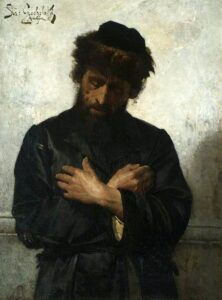
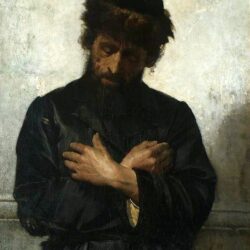
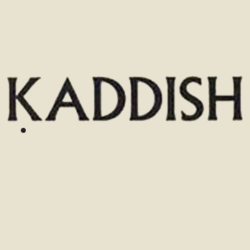
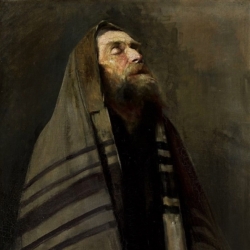
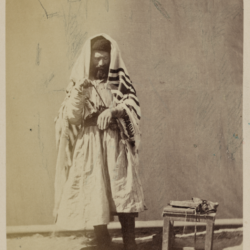


Leave a Reply